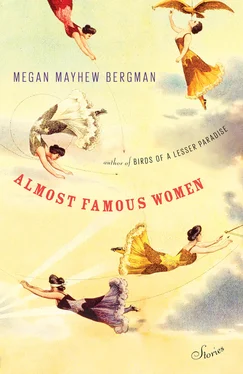She enjoys having something people want. A smile plays at her lips, but she tamps it down. She leans against a maple tree on the edge of the road, presses her back against it, pulling one foot up on the trunk of the tree, flamingo-like. She lifts her chin and looks into the breeze so that it lifts her hair from her face.
I still know how to own a scene and cut a figure, she thinks.
The car slows, and a man rolls down the passenger-side window.
“Is this the Millay place?”
“Perhaps,” she says, coyly.
She walks toward the car and leans forward, one hand on her hip. She likes to think of herself as a hard-boiled heroine, and lets her eyes do the talking. The men are in their forties, thin and well-dressed.
“We were hoping to speak to someone about Mrs. Millay’s papers,” the man on the passenger side says politely. She can see his jacket draped across his knees.
“Of course you are.”
“Can you help us?”
“I could. But I might not.” She raises an eyebrow, which she keeps neat and plucked.
“We have Mrs. Millay’s legacy in mind.”
“You’re one in a hundred, you know that? I see your type every month.” She shakes her head.
“We won’t trouble you long. We have a letter of introduction.”
“You all do. Let me think about it. Come back in the morning.”
“We just drove up for the day, and are headed back to the city—” The passenger seems desperate, and this delights Norma. This is what she has come to live for, reeling people in only to release them.
“Come back in the morning.”
She turns her back to the idling car and heads up the steep hill to the farmhouse, where she pours herself a glass of red wine and scrambles an egg.
She likes to sleep alone in Vincent’s bed, in Vincent’s fine linen sheets with the too-long monogram, especially when the fall winds shake the apples from the trees and Charlie is chain smoking and painting nudes of another college student in his studio across the road. Was this how it was for Vincent on her last October night? Lonely? Too quiet? The hunters at work in the woods, a glass of wine in hand?
And what position is the college student in? Norma wonders. Legs splayed open, draped in a red cloth, that same damn piece of red cloth he put over everyone? Does it matter?
She turns down the covers. She can reach the bureau from the bed and its contents, the book Vincent was reading the week she died, the rings she left in a ceramic dish. Norma slides her sister’s rings over her arthritic fingers, on and off, on and off.
“How can you live like this?” Charlie has asked her.
She doesn’t let him in Vincent’s bed. She won’t let him empty Vincent’s yellowed mouthwash or move her suitcase. Squirrels have nested in the divan on the porch, and one made fast work out of books and a windowsill in the library. Cobalt-blue morphine bottles still glitter like sapphires in the trash pile. The kitchen ceiling is dotted with wet, circular spots of mold. But she doesn’t want to change anything; adjusting a piece of sheet music on the piano, disturbing a ceramic deer on the kitchen shelf, moving the biting instructions Vincent left for the help, unfolding the towels in the bathroom — it might rob the place of her sister’s spirit.
Norma can’t sleep well that night. It isn’t that she hasn’t seen Charlie, or that the tax bill has increased, or that the termites are nibbling away at the cottage. Something about the aspiring biographer worries her, or maybe it’s the realization that she’s now in her seventies and when she passes away someone will get the papers, someone will see the insides of Vincent’s drawers. Though it’s still dark outside, she pulls on pants, boots, and her yellow slicker and, armed with matches and a bag of Vincent’s belongings, walks the quarter mile to the trash pile in the woods. She passes Cora’s grave surrounded by an iron fence, and then the two heavy stones for Vincent and Eugen, surrounded by moss and fallen leaves.
I can’t give away everything, she thinks. I’m not ready. She’s not ready.
When Norma reaches the trash pile, she looks around to make sure she’s alone. Young poets come out here, screwing each other desperately in the woods, carving their names into the trees, stealing glass bottles, hoping for magic to find them.
Maybe it does.
Norma doesn’t mind the poets. She lets them sleep in the cottage. She lets them sleep with Charlie too, and she’s made love to more than one. She may be old, but they want to get close to Vincent and she’s the best option they have.
Certain she’s alone, she arranges kindling and starts a fire, onto which she tosses a handful of nude photographs, a few desperate-sounding letters, and Vincent’s ivory dildo, which refuses to burn for a long time, but finally disappears into a dark, indeterminable object.
Chilled, she retraces her steps through the woods and returns to Vincent’s bed, half-listening for the wheels of the dark sedan groaning over the gravel. Norma’s silver hair is spread out across Vincent’s pillow. It took her months to wash the linens after coming here. It took her months to find her appetite, to bring herself to look at the last poem Vincent wrote, the one that must have landed like a feather on the stairs next to her body after she fell.
She thinks of the catamounts slinking through the forest, the brown bear lumbering through the blueberry bushes in the early dawn. She knows how the farm is, and how it was, and that it is still a place where she can be alone with her sister.
On quiet mornings like this, Norma can most vividly picture Vincent in her blue robe, a little hunched, head surely aching, walking barefoot over the lawn with a notebook in hand, settling onto the ground, one small foot tucked underneath her body so that she could watch a fawn until the dew seeped into her nightgown, and the loyal doe returned.

Romaine Brooks, self-portrait, 1923.
Photo reprinted with permission of the Smithsonian
American Art Museum, Washington, DC/Art Resource, NY.
We are what we can be, not what we ought to be.
— From Romaine Brooks’s notebooks
On the third floor of her villa in Fiesole, Romaine tries to control the afternoon sun by slapping a yardstick against the blinds. A screaming wedge of white light falls across her face. Unable to rise from her chair, she rings for the houseboy, Mario.
He hears the clang of the bronze bell and sprints up from the kitchen, where he’s been smoking cigarettes with the cook. He runs a hand through his thick hair and clears his throat before entering the room.
Signora, he says humbly, bowing his head.
Close the blinds, she says.
He nods solemnly and releases the wooden slats, which collapse against the window with a clatter. The wedge of light disappears. Romaine, he has learned, likes to sit alone in the dark.
He treads lightly across the floor. Noise, like motorbikes, or a woman singing one house over, can trigger Romaine’s rage, and if he isn’t careful she’ll spend the afternoon bedridden with a pillow over her head, then complain about him to the night nurse, claiming, That boy exposes me to torture. She’ll go on about how an artist must protect her senses, and no one likes her to go on about anything.
I will work today, she tells Mario, but when he returns with her canvas and paints, Romaine is asleep, body curled like a prawn, her head lolled to the side, large eyes closed, breathing heavily. She wears her usual outfit, a white silk blouse, loose bow tie, faded brocade jacket with dander on the shoulders. He hates the way gravity sucks at her chin, the crescent-shaped pillows of skin underneath her eyes. Her hair, occasionally dyed black, is short and unwashed, primarily because it is an act of great courage to wash her. The first time he tried, she slapped him with the washcloth.
Читать дальше













